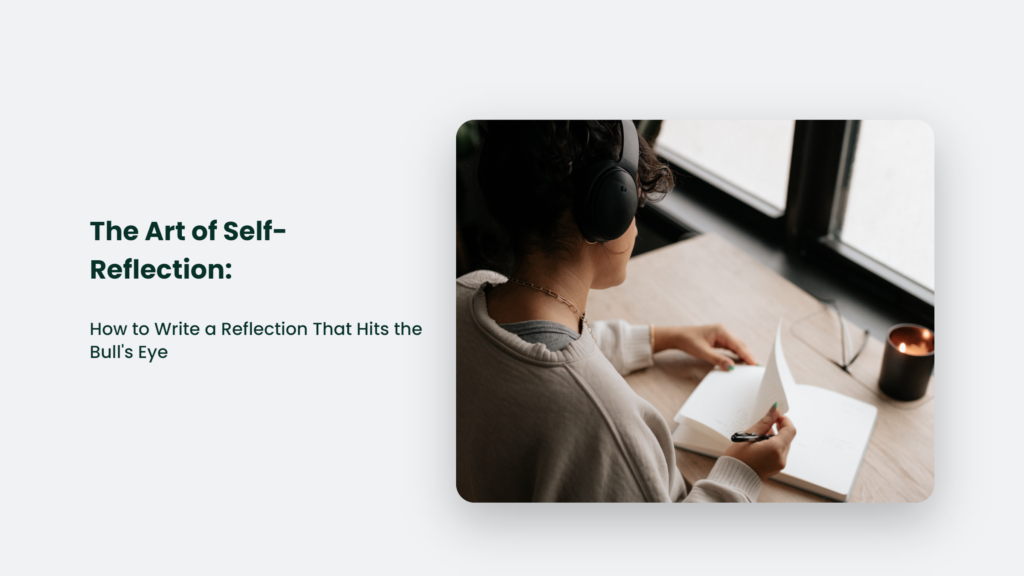

The Art of Self-Reflection: How to Write a Reflection That Hits the Bull’s Eye

As Seen On
Listen, I’ll be straightforward: Learning how to write a reflection is not for the faint-hearted. It’s like standing buck-naked in a hall of mirrors. But instead of freaking out about those love handles you’ve been cultivating over the years, you’re looking at your thoughts, feelings, and experiences. Pretty damn scary, huh?
But don’t sweat it. You’re about to enter a crash course on how to make sense of the chaos in your head and articulate it in a way that looks good on paper and sounds like a symphony to your ears.

Are You Ready to Dive In?
Still here? Good. But are you ready to face yourself in the harsh light of your honesty? Are you ready to dissect your thoughts, unmask your feelings, and expose your soul to the critical eye of your own judgement? You think I’m joking, but it’s no walk in the park.
Now that we’ve got the existential crisis out of the way let’s dig in, shall we?
How to Write a Reflection: The Deep Dive
As I said before, writing a reflection is like performing an autopsy. You’re not standing over a cold, lifeless body in a morgue this time. Instead, you’re dissecting your experiences and thoughts under the piercing scrutiny of your self-awareness. And trust me, it can be even scarier than any horror movie you’ve watched.
But why would anyone willingly subject themselves to this, you ask? Let’s hear it from Socrates, one of the most influential philosophers ever. He said, “An unexamined life is not worth living.”
He wasn’t suggesting that we lead miserable lives if we’re not reflecting. No, Socrates meant that a life devoid of introspection, reflection papers, and self-analysis lacks depth, growth, and evolution.
So, ready to take a headlong plunge into the world of reflection writing? Strap in. It’s about to get deep.
The Purpose That Drives You
First and foremost, you need to understand the purpose of a reflection. It’s not a platform to show off how fabulous your life is. Neither is it a diary to wallow in self-pity over your misfortunes. The goal here is growth and learning, and it’s as simple and complex as that.
The purpose or idea of a reflection is to learn from your experiences – good or bad, happy or sad, triumphant or disastrous. Your goal is to examine your actions, dissect your decisions, analyze your emotions, and, most importantly, identify what you’ve learned from all this introspection.
If you’re merely patting yourself on the back or ruing over your mistakes, buddy, you’ve missed the mark. Remember, reflection isn’t about self-adulation or self-pity. It’s about self-improvement.
Getting Personal: The Mirror on the Wall
Reflection writing is not the time to hide behind the impersonal “one” or the formal “we.” It is reflective writing is your time to shine. It’s about YOU. So, brace yourself because you’re about to dive headfirst into the deep, often chaotic pool of your emotions and experiences.
Let me tell you, getting personal in your writing is no easy task. It’s like baring your soul on paper. You’ll have to relive your experiences, grapple with your emotions, question your decisions, and face your vulnerabilities. But here’s the catch. The more you reveal, the more valuable your reflection becomes.
But remember, getting personal doesn’t mean you overshare or turn your reflection into a melodramatic soap opera. Maintain a balance and ensure that whatever personal elements you include contribute to your overall reflection and learning.

The Art of Analyzing and Evaluating
Alright, so you’ve gotten personal. You’ve narrated your experiences and dived into your feelings. But your job still needs to be completed. Writing a reflection paper isn’t just about recounting experiences or describing feelings. It’s about analyzing and evaluating those experiences and feelings.
Ask yourself, “Why did this happen?” “What were the circumstances that led to this event?” “How did I react, and why?” “How did it make me feel?” “Why did it make me feel this way?” “What did I learn from it?” “How has it changed my perspective or approach?” “What would I do differently if I faced a similar situation?”
These questions aren’t just philosophical mumbo-jumbo. They’re the essence of a reflection. They help you peel off the superficial layers and reach the core of your experiences. They enable you to understand the intricacies of your emotions.
And most importantly, they allow you to learn, grow, and evolve your academic writing yourself. So, embrace these questions. They are your guiding lights in the murky waters of reflection writing.
Structuring Your Thoughts: The Artful Anatomy of Reflection
So, you’ve got your content down, but that’s just part of the equation. You also need to know how to structure your and write a reflection paper properly. Without a solid structure, your reflection would be as messy as a teenager’s room – full of stuff, but good luck finding anything.
Think of the body paragraphs and the structure as the skeleton of your reflection, holding everything together. It provides a flow to your writing and guides your reader through your thoughts and experiences. Even though a reflection is deeply personal and often subjective, it should still follow a clear and coherent structure – the introduction, the body, and the conclusion.
Introduction:
This is your stage-setter, hook, and reader’s first impression. Describe the experience, person or event you’ll be reflecting on and introduce the main themes of your reflection. A well-crafted introduction can draw your reader in like a moth to a flame.
Body:
Welcome to the heart of your reflection. It is where you spill your guts. Discuss your thoughts, emotions, and insights related to the experience. Break it into digestible chunks – what happened, how it affected you, why it made you feel a certain way, what you learned from it, and so on. Remember to keep it organized and coherent. Don’t jump around like a kangaroo on a caffeine high.
Conclusion:
The finale, the wrap-up, the last hurrah. It is where you tie up loose ends and bring your writing reflection papers to a close. Recap your main points, discuss your learnings, and how you’ve grown from the experience. Aim for a conclusion that satisfies your reader, like after a good meal.
So, there you have it. The purpose, personal touch, analysis, and structure are fundamental pillars of writing a reflection. It’s a complex, sometimes daunting task. It requires introspection, honesty, courage, and a whole lot of patience. But believe me; it’s worth it.
Because, in the end, you’re not just writing an essay or a reflection. You’re exploring the depths of your psyche, understanding your emotions, learning from your experiences, and, most importantly, growing. And isn’t that a journey worth taking?
Some Reflection-Writing Techniques to Try
Now that you’ve got the basics down, here are some techniques to add some sparkle to your reflection:
Quotes and References:
Use them to back up your points or illustrate your ideas. Just remember to attribute them correctly. Plagiarism isn’t cool, and neither is getting sued for copyright infringement.
Use of Humor:
Sprinkle some puns and jokes throughout your reflection. It will lighten the mood and make your writing more engaging. But remember humour is like salt: too much can ruin the dish.
Rhetorical Questions:
Rhetorical questions engage the reader and stimulate their thought process. They’re like an espresso shot for the brain.
Metaphors:
Metaphors can enhance your writing by providing vivid and relatable imagery. However, steer clear from cliched ones. Originality, my friend, is your best bet.
Dialogue:
Incorporating snippets of dialogue can bring life to your reflections. But remember, we’re not writing a screenplay here. Keep the dialogues to a minimum and relevant to the reflection.
Alright, so far, we’ve built the skeleton of the reflection. Let’s put some flesh on it.
Adding Meat to Your Reflection
The key to writing a meaty reflection paper is to explore and analyze your experiences, thoughts, and feelings. There are three main areas you should focus on:
- What Did You Experience?: Start by describing your experience. Try to recall every detail. Yes, even that embarrassing moment you’d rather forget.
- How Did You Feel?: Get in touch with your feelings. It isn’t the time to be stoic. Was the experience exhilarating like a roller coaster ride or as dull as watching paint dry?
- What Did You Learn?: This is the part where you show off your growth. Share the life-altering wisdom you’ve gleaned from your experiences.
And voila! You’ve got yourself a top-notch reflection. But wait, there’s more—time for some polishing.
Polishing Your Reflection: The Dos and Don’ts
Even the most authentic and profound reflection can lose its charm if poorly written. Here are some dos and don’ts to help you add the final touches:
DO:
- Use longer paragraphs and a mix of short and long sentences for variety.
- Incorporate power words to create emotion. Words like “extraordinary”, “remarkable”, and “astonishing” can instantly amp up your writing.
- Use lists. They are a great way to break down complex ideas and make your content more readable.
DON’T:
- Avoid excessive storytelling. A reflection should focus on your thoughts and feelings, not the events.
- Refrain from writing extensive conversations. A reflection is not a screenplay.
Alright, that’s the whole enchilada. But, as promised, let’s tackle some FAQs.
Frequently Asked Questions:
How personal should I get in my reflection?
As personal as you’re comfortable with. A reflection is an intimate piece of writing; the more honest and authentic you are, the more valuable it becomes.
How do I make my reflection engaging?
Use techniques like humour, rhetorical questions, metaphors, and dialogue. Also, incorporate power words to evoke emotions and use lists to break down complex ideas.
The Bottom Line:
Writing a reflection may seem daunting, but remember, it’s a journey of self-discovery. So, don your explorer’s hat and embark on this exciting adventure of introspection. And while you’re at it, remember to enjoy the ride. Because, in the end, the journey is the destination. Safe travels!
Konger
Up until working with Casey, we had only had poor to mediocre experiences outsourcing work to agencies. Casey & the team at CJ&CO are the exception to the rule.
Communication was beyond great, his understanding of our vision was phenomenal, and instead of needing babysitting like the other agencies we worked with, he was not only completely dependable but also gave us sound suggestions on how to get better results, at the risk of us not needing him for the initial job we requested (absolute gem).
This has truly been the first time we worked with someone outside of our business that quickly grasped our vision, and that I could completely forget about and would still deliver above expectations.
I honestly can't wait to work in many more projects together!
Disclaimer
*The information this blog provides is for general informational purposes only and is not intended as financial or professional advice. The information may not reflect current developments and may be changed or updated without notice. Any opinions expressed on this blog are the author’s own and do not necessarily reflect the views of the author’s employer or any other organization. You should not act or rely on any information contained in this blog without first seeking the advice of a professional. No representation or warranty, express or implied, is made as to the accuracy or completeness of the information contained in this blog. The author and affiliated parties assume no liability for any errors or omissions.

